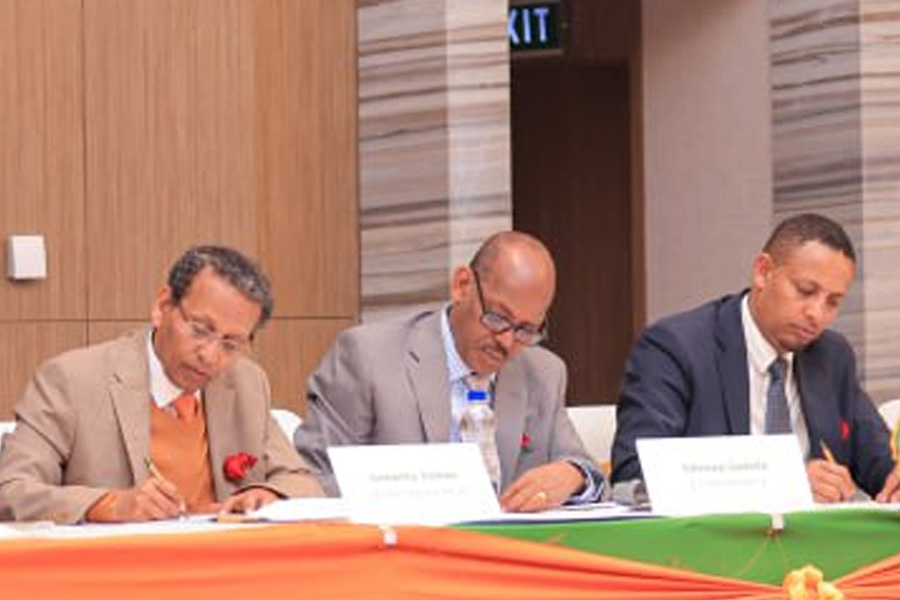
Radar | Jan 01,2022
In a significant policy shift, authorities have fully opened the logistics and transport sector to foreign investors. Minister of Transport and Logistics Alemu Sime (PhD) announced that 100pc foreign ownership of logistics companies operating in the country is now allowed.
The move follows macroeconomic reforms introduced two months ago and marks a departure from previous regulations that limited foreign operators to a maximum 49pc stake in joint ventures with domestic firms.
While final approval for implementation is pending, the announcement signals a clear intent to liberalise the industry. Alemu states that “this will pave the way for increased foreign investment.” However, domestic industry players expressed reserve.
For Dawit Woubishet, president of the 95-member Ethiopian Freight Forwarders and Shipping Agents Association (EFFSA), opening up the sector without enhancing the operational capacity of domestic companies is like putting the cart before the horse. "It is too soon. Domestic operators' efficiency needs to improve first," he said, citing financial and infrastructural hurdles.
Alemu, however, argued that external competition would address inefficiencies and mismatches among freight operators, leading to lower costs and faster service.
"There is a need to improve the competitiveness of operators," he told Fortune.
Ahmed Shide, Minister of Finance, pointed to several policy adjustments made as part of the new macroeconomic reform, aimed at opening the door to foreign investment and addressing previous bottlenecks in the logistics sector. "Logistics reforms will transform the economy," he said.
According to Abdulber Shemsu, director of the Ethiopian Maritime Authority (EMA), services such as multimodal transport, dry ports, and transportation are now open to foreign operators. The authority floated a second tender last week for private freight forwarders, following the entry of three operators in the first round.
Tikur Abay, Panafric Global, and Cosmos Multimodal Sc have been etched to become the first privately owned multimodal logistics operators in the country several months ago. However, their operations are yet to hit the ground.
Elizabeth Getahun, CEO of PanAfric Global, said operators are still awaiting permission but indicated that progress is being made towards starting operations soon, although some procedures remain to be resolved.
"We are waiting for a go-ahead to commence operation," she said.
Finance minister Ahmed, stated that enhancing trade relationships and connectivity with regional countries will remain his government's priority. He also mentioned ongoing improvements of road infrastructure including the soon to be operational 730-million-dollar World Bank-financed Mieso-Dire Dawa route—a four-lane expressway on a vital artery where Ethiopia’s import and export trade transits.
"The expressway will begin operation shortly," he said, while mentioning ongoing plans to obtain financing for the road to Galafi.
Last week saw lively discussions at Skylight Hotel with high-ranking officials from different sectors taking the stage to discuss the perils and prospects in the logistics sector.
A logistics performance study in 2023 scored Ethiopia 2.94 out of five, with a 53.9pc performance ranking in customs efficiency, infrastructure, logistics service quality, tracing and tracking, ease of international shipping and delivery time taken into account.
The study was conducted under three logistics experts, namely Matiwos Ensermu (PhD), Mekonnen Abera, and Yehualashet Jemere, with finance from the World Bank. It pointed out that the country's logistics performance ranked the lowest in the categories of infrastructure, international shipment competitiveness, and time, with 2.84, 2.82 and 2.89 points, respectively.
Matiwos indicated the quick need for improvement stating difficulties at Djibouti's customs, dry ports, and border checkpoints. He also mentioned infrastructure hurdles where the road from Dikhil to Galafi—a pivotal transport node—has been seriously damaged with no maintenance work done for the last 10 years.
"The logistics supply chain is as good as its weakest link," he said, stating that far-reaching consequences in competitiveness could undermine the country's economic ambitions.
Matiwos argued that the Port of Djibouti’s infrastructure, though substantial, suffers from outdated equipment and insufficient maintenance. Frequent malfunctions of essential cranes lead to extended delays, and the labour force lacks specialised training for modern, large-scale maritime operations. He stressed the need to improve investment, digitisation and improving the sustainability of infrastructures.
In a recent Container Port Performance Index (CPPI), the World Bank recorded a dramatic decline for Djibouti’s ports, which plummeted from 26th place last year to 379th out of 405 in the latest ranking. The government relies on revenues from port operations to support public services and infrastructure projects, making efficient port operations vital for the country’s economy.
Djibouti ports, operated by the Djibouti Ports & Free Trade Zones (DPFTZ), have served as the main entrance point for Ethiopia’s trade for over the last two decades, costing Ethiopia around 1.5 billion dollars annually. From the 7.6 million tons of freight goods imported or exported in a six-month period last year, 95.1pc went through Djibouti, with Tadjoura Port accounting for 2.75pc. The remaining 1.78pc was processed through the Berbera Port in Somaliland, with 0.2pc coming through Port Sudan.
The state-owned Ethiopian Shipping and Logistics’ (ESL) CEO, Berisso Amalo (PhD), said that as the shipper has increased the number of vessels it operates, external challenges at Djibouti ports remain a huge burden. He said that service delays, port clogs and disrupted roads are dealt with through negotiations. "Cost and time efficiency need to be improved," he told Fortune. ESL operates 10 vessels and 572 trucks which cater to nearly 90pc of the country's logistics demand.
Minister of Trade and Regional Integration Kassahun Goffe (PhD) points out the need to improve time and cost efficiency to make Ethiopia's trade internationally competitive. He referred to improvements in logistics performance regarding livestock exports using the Ethio-Djibouti Railway.
"We expect record export revenues this year," he said.
The sentiment was shared by Mamo Mihretu, Governor of the Central Bank, who highlighted that the country's logistics sector has been hampered by a combination of policy and regulatory gaps, infrastructure deficiencies, customs bottlenecks, and cumbersome bank procedures, leading to increased costs and delays.
Ethiopian Customs Commissioner Debele Kabeta highlighted that a significant problem is importers' failure to clear their imports, primarily caused by liquidity shortages in commercial banks.
Mamo refuted Debele's concerns about financial issues in commercial banks, stating that their foreign exchange reserves have significantly improved in recent months. "Commercial banks have sufficient foreign currency reserves," he said.
However, Mamo pointed to the ongoing work to supervise the foreign currency management and working procedure of commercial banks to filter out misbehaviour. He added that surveyors have already been deployed.
A report presented by Fraol Tafa, deputy director of Ethiopian Maritime Authority (EMA), states that the country has managed to save 60 million dollars in the last fiscal year due to improvements in vessel dwell time, railway efficiency, port diversification, and modernisation cost-reduction.
He emphasized the significant improvements made in the logistics sector over the past 10 years, citing 98 interventions, including contentious regulatory reforms. " We have taken significant steps towards improving the sector in the past year," he said.
Meeting the logistics needs of Ethiopia's 120 million population, spread across a land area of around 1.12 million square kilometres, calls for diversified port alternatives, regardless of global shipping crises.
The authority's report shows port diversification has saved the country over 2.8 million dollars. The country has made its first trial shipment from Kenya, importing 60,000tns of fertiliser in the last fiscal year. Abdulber, EMA director general, stated that exploring alternative trade routes is a proactive response to the logistics challenges caused by the Red Sea crisis, which has disrupted container trade through the Suez Canal.
He said importing items through Kenya is a long-standing strategy. Ethiopia's interest in Lamu Port comes at a time when the logistics and trade dynamics in the Horn of Africa are increasingly complex. He also stated plans to expand using Tadjoura and Berbera.
PUBLISHED ON
Oct 13,2024 [ VOL
25 , NO
1276]

Radar | Jan 01,2022

Delicate Number | Jun 07,2025

Viewpoints | Feb 13,2021

Agenda | Nov 19,2022

Radar | Oct 06,2024

Featured | May 04,2024

Radar | Jun 03,2023

Covid-19 | Apr 08,2020

Radar | Dec 15,2024

Fortune News | May 27,2023

Dec 22 , 2024 . By TIZITA SHEWAFERAW
Charged with transforming colossal state-owned enterprises into modern and competitiv...

Aug 18 , 2024 . By AKSAH ITALO
Although predictable Yonas Zerihun's job in the ride-hailing service is not immune to...

Jul 28 , 2024 . By TIZITA SHEWAFERAW
Unhabitual, perhaps too many, Samuel Gebreyohannes, 38, used to occasionally enjoy a couple of beers at breakfast. However, he recently swit...

Jul 13 , 2024 . By AKSAH ITALO
Investors who rely on tractors, trucks, and field vehicles for commuting, transporting commodities, and f...

Oct 25 , 2025
The regulatory machinery is on overdrive. In only two years, no fewer than 35 new pro...

Oct 18 , 2025
The political establishment, notably the ruling party and its top brass, has become p...

Oct 11 , 2025
Ladislas Farago, a roving Associated Press (AP) correspondent, arrived in Ethiopia in...

Oct 4 , 2025
Eyob Tekalegn (PhD) had been in the Governor's chair for only weeks when, on Septembe...